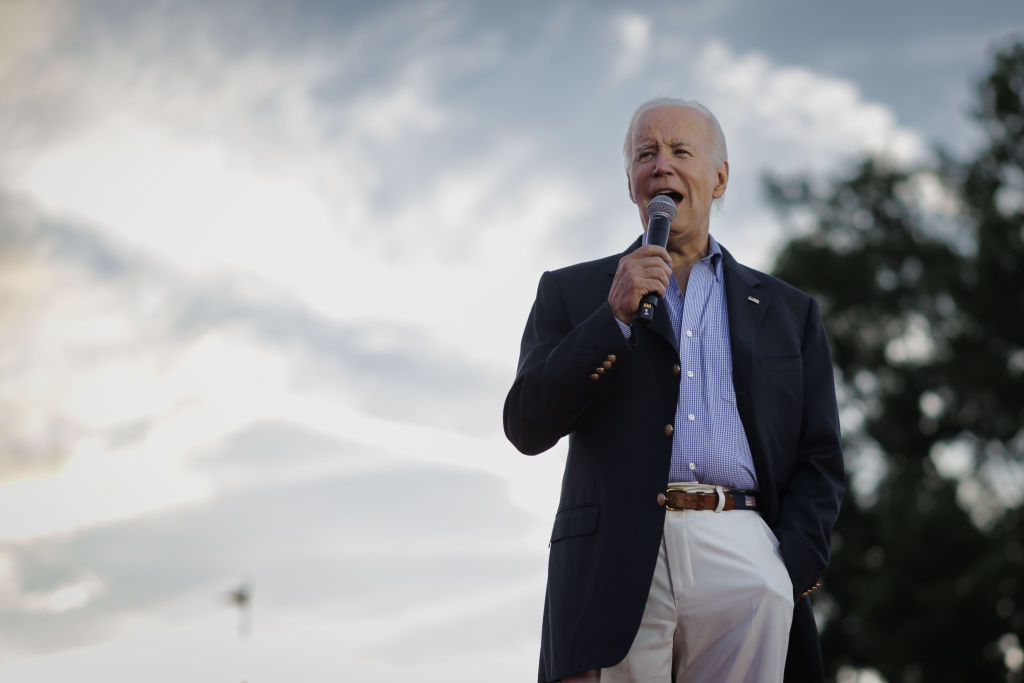When it comes to the economy, why does Biden get little credit?
Inflation is cooling — but voters are still relatively unimpressed with the president's economic record


A free daily email with the biggest news stories of the day – and the best features from TheWeek.com
You are now subscribed
Your newsletter sign-up was successful
By most economists' accounts, the recently-released June CPI data is a positive for the economy. And so was the May data the month before that. But even as the U.S. emerges from the iron grip of inflation, President Biden and his signature "Bidenomics" approach are getting little credit. Perhaps unfairly, shouldering the blame for an underperforming economy is a typical pitfall of the presidency — yet so is owning the political boon that comes with a healthy one. And Biden, for all his attempts, is struggling to convince the public that he deserves some kudos on that front; As of July 13, just 38.7% of Americans approved of the way he was handling the economy, according to a polling average from RealClearPolitics. Why are voters so reluctant to give the president his flowers?
It's a messaging problem
Unlike other presidents, like Ronald Reagan (against whose "Reagonomics" Biden has contrasted his own plan), Uncle Joe isn't as strong of a salesman, John Feehery, a former GOP aide, told the Pittsburgh Post-Gazette. "He's not a very good messenger," Feehery said. "Biden doesn't really get credit for being a job creator. He's a politician and people don't like giving credit to politicians." The White House must also be "more forceful and more cogent in the argument that the economy is humming and moving along," added Mo Butler, a Democratic consultant from New Jersey. "You hear fragments of a compelling message but you don't have the message yet."
Meanwhile, MSNBC's Chris Hayes' has a different-but-related theory as to why "Bidenomics" is lacking in positive press: The sectors having the worst time economically as of late "also happen to be the ones closest to the megaphones," specifically the media and tech companies responsible for providing the public with news about the economy, he speculated on "All In with Chris Hayes." Meanwhile, those who have seen the "greatest relative economic gains" are those "at the very bottom" of the totem pole and the "least influential in the national conversation about the economy."
The Week
Escape your echo chamber. Get the facts behind the news, plus analysis from multiple perspectives.

Sign up for The Week's Free Newsletters
From our morning news briefing to a weekly Good News Newsletter, get the best of The Week delivered directly to your inbox.
From our morning news briefing to a weekly Good News Newsletter, get the best of The Week delivered directly to your inbox.
To that end, the media, against which most Americans hedge their judgments about the state of the nation, has been particularly doomsday about the economy. People can't believe Biden is doing a good job on the economy because "it isn't what the business press tells them," said The National Review's Timothy Noah. "When it comes to awareness of 'the economy,'" added Paul Waldman in The Washington Post, "people have very little to go on from their individual lives" and instead use the media to learn "what's happening in the country as a whole." And throughout "much of Biden's term," the debate in the media has "pitted Republicans saying that we're living through an economic catastrophe against Biden and his allies saying, A lot of people are suffering out there, we know it's bad, but we're making progress." That constant capitulation, combined with GOP negging, certainly hasn't bolstered voter confidence.
It's a time and perception problem
"Although inflation has been falling for nearly a year," John Cassidy wrote for The New Yorker, "the process has been gradual, and people may be only starting to notice." Most of the public also tends to watch "individual price levels" rather than the specific inflation rate, and many of those "remain considerably higher than they were when Biden took office."
"The vast majority of U.S. workers did not lose their jobs during the Covid downturn," added Eric Levitz in The Intelligencer. "Therefore, they did not experience the labor market's rapid recovery as a reprieve from precarity." Instead, this post-pandemic period has been characterized by "falling real wages, as prices have grown faster than paychecks." As a result, "for most U.S. voters, Bidenomics has yet to deliver unambiguous economic improvement." (Worth noting: Wage growth in June "rapidly outpaced" inflation for the first time since March 2021, though that data was released six days after the publication of Levitz' article).
The American public is also probably just shell-shocked after a tumultuous three years, and not ready to let its guard down. "Just think of what the American people have just been through," Lael Brainard, director of the National Economic Council, said at the end of last month, citing the coronavirus pandemic and the spike in energy prices that came as a result of the Russo-Ukrainian war. "Those are pretty traumatic economic events, and it's going to take a while for people to feel really confident and secure."
A free daily email with the biggest news stories of the day – and the best features from TheWeek.com
Brigid Kennedy worked at The Week from 2021 to 2023 as a staff writer, junior editor and then story editor, with an interest in U.S. politics, the economy and the music industry.
